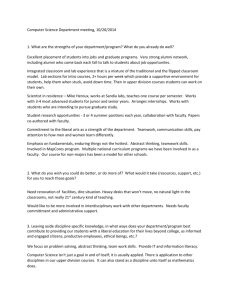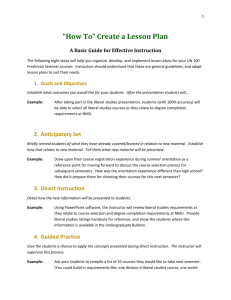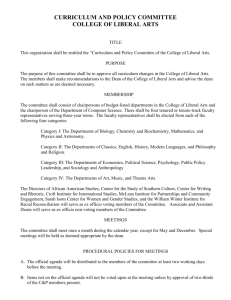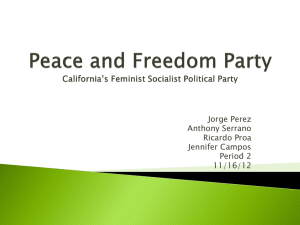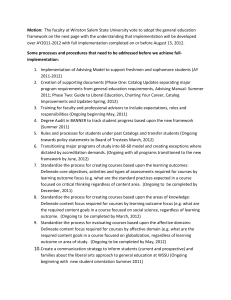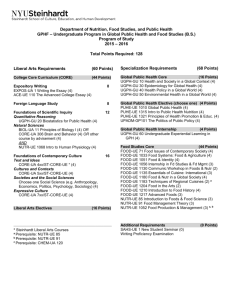HONG KONG BAPTIST UNIVERSITY
advertisement
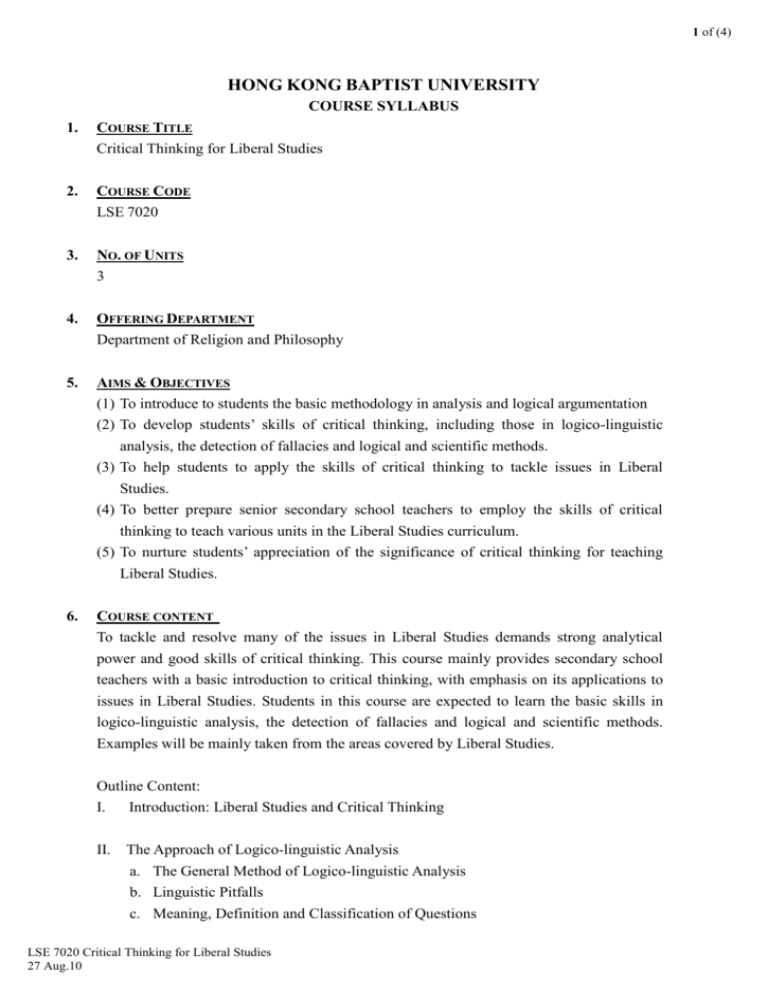
1 of (4) HONG KONG BAPTIST UNIVERSITY COURSE SYLLABUS 1. COURSE TITLE Critical Thinking for Liberal Studies 2. COURSE CODE LSE 7020 3. NO. OF UNITS 3 4. OFFERING DEPARTMENT Department of Religion and Philosophy 5. AIMS & OBJECTIVES (1) To introduce to students the basic methodology in analysis and logical argumentation (2) To develop students’ skills of critical thinking, including those in logico-linguistic analysis, the detection of fallacies and logical and scientific methods. (3) To help students to apply the skills of critical thinking to tackle issues in Liberal Studies. (4) To better prepare senior secondary school teachers to employ the skills of critical thinking to teach various units in the Liberal Studies curriculum. (5) To nurture students’ appreciation of the significance of critical thinking for teaching Liberal Studies. 6. COURSE CONTENT To tackle and resolve many of the issues in Liberal Studies demands strong analytical power and good skills of critical thinking. This course mainly provides secondary school teachers with a basic introduction to critical thinking, with emphasis on its applications to issues in Liberal Studies. Students in this course are expected to learn the basic skills in logico-linguistic analysis, the detection of fallacies and logical and scientific methods. Examples will be mainly taken from the areas covered by Liberal Studies. Outline Content: I. Introduction: Liberal Studies and Critical Thinking II. The Approach of Logico-linguistic Analysis a. The General Method of Logico-linguistic Analysis b. Linguistic Pitfalls c. Meaning, Definition and Classification of Questions LSE 7020 Critical Thinking for Liberal Studies 27 Aug.10 2 of (4) III. Informal Fallacies a. Definition of “Fallacy” b. Four Basic Types of Fallacies IV. Methods of Logic a. Reasoning and Argumentation b. Deduction and Validity c. The Method of Deduction V. Induction and Scientific Method a. Induction and Inductive Correctness b. Probable Inference c. Mill’s Methods d. Science and Hypothesis VI. 7. 8. Practical Applications in Liberal Studies COURSE INTENDED LEARNING OUTCOMES (CILOS) CILO By the end of the course, students should be able to: CILO 1 Explain the basic concepts, principles and methods of critical thinking, including those related to logico-linguistic analysis, the detection of fallacies and logical and scientific methods. CILO 2 Demonstrate an understanding of the methods and skills in critical thinking. CILO 3 Apply the methods of critical thinking to issues and problems in Liberal Studies. CILO 4 Detect and expose fallacies in the contexts of issues in Liberal Studies. CILO 5 Analyze arguments and valid argument forms in the contexts of issues in Liberal Studies. TEACHING & LEARNING ACTIVITIES (TLAS) CILO NO. TLAS CILO 1, 2 Students will be given instruction on basic concepts and principles and methods of critical thinking. (Lectures and classroom discussions) CILO 2, 3, 4 Students will work in teams for group presentations and discussions. (Tutorial presentations and discussions) CILO 2, 3, 4 Students will find out concrete cases in Liberal Studies and detect the LSE 7020 Critical Thinking for Liberal Studies 27 Aug.10 3 of (4) fallacies in them. CILO 2, 3, 5 9. (Assignments) Students will be given concrete cases and problems to analyze arguments and argument forms. (Tutorial presentations) ASSESSMENT METHODS (AMS) Type of Assessment Tutorials Weighting CILOs to be Description of Assessment Tasks addressed 40 % 2, 3, 4, 5 Group presentations and discussions will assess students’ contributions to analysis and problem solving, and their engagement with other students. Assignments 20 % 3, 4, 5 Assignments will test students’ ability to apply the basic concepts and principles of critical thinking to concrete cases in Liberal Studies. Final Exam 40% 1, 2, 3, 4, 5 The examination will assess students’ knowledge of the basic principles of critical thinking, and their application to issues in Liberal Studies. 10. TEXTBOOKS / RECOMMENDED READINGS Basic Texts in Religious Studies: Bowell, T. and Kemp, G. Critical Thinking: A Concise Guide. London: Routledge 2002. Browne, M. N. and S. M. Keeley. Asking the Right Questions. 6th ed. Englewood Cliff: Prentice-Hall, 2001. Copi, I. M., and C. Cohen. Introduction to Logic. 12th ed. New York: Macmillan, 2004. Diestler, S. Becoming a Critical Thinker. 4th ed. New York: Macmillan, 2005. Damer, E. Attacking Faulty Reasoning. California: Wadsworth, l980. Hurley, Patrick J. A Concise Introduction to Logic. 7th edition. Belmont: Wadsworth, Thomson Learning, 2000. Kelly, John J. The Essence of Logic. London: Prentice Hall, 1997. Missimer, C. A. Good Arguments: An Introduction to Critical Thinking. 2nd edition. Englewood Cliffs: Prentice-Hall, 1990. Porter, B. F. The Voice of Reason: Fundamentals of Critical Thinking. Oxford: Oxford University Press 2001. Priest, Graham. Logic: A Very Short Introduction. Oxford: Oxford University Press, 2000. Salmon, M. H. Introduction to Logic and Critical Thinking. 5th ed. California: Wadsworth, 2006. Salmon, W. C. Logic. 3rd edition. Englewood Cliffs, N.J.: Prentice-Hall, 1984; Chinese LSE 7020 Critical Thinking for Liberal Studies 27 Aug.10 4 of (4) translation of the 1st edition by Ho Xiu Huang. Taipei: Sam Ming Press, 1967. Schwarze, S. and Lape, H. Thinking Socratically: Critical Thinking about Everyday Issues. 2nd ed. Englewood Cliff: Prentice-Hall, 2000. Shaw, Patrick. Logic and Its Limits. 2nd edition. Oxford: Oxford University Press, 1997. Thouless, R. H. Straight and Crooked Thinking. London: Pan, 1974. Walton, D. N. Informal Logic: A Handbook for Critical Argumentation. Cambridge: Cambridge University Press, 1989. 林正弘著:《邏輯》。台灣:三民書局,1991 年。 李天命著:《哲道行者》。香港:明報出版社,2005 年。 李天命著:《李天命的思考藝術》(終定本)。香港:明報出版社,1995 年。 李天命著:《語理分析的思考方法》。香港:青年書屋,1981 年。 拉比著(王曼君譯) :《如何想得清楚和正確》。台灣:水牛出版社,1990 年。 周禮全著:《邏輯》。 北京:人民出版社,1994 年。 LSE 7020 Critical Thinking for Liberal Studies 27 Aug.10


